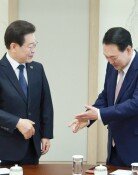Rep. Roh Hoe-chan’s idea to ‘halve’ the allowance for lawmakers
Rep. Roh Hoe-chan’s idea to ‘halve’ the allowance for lawmakers
Posted July. 05, 2016 07:35,
Updated July. 05, 2016 08:35
Instead of the tax duty, Romans were charged with the duty to serve their country. The nation did not pay them, but only provided food and housing. The citizens had to even prepare their own swords and shields. Roman politicians, or senators, were not paid for their service, either. Rather, inheritance tax was imposed on them to finance pensions for veterans. Politics and war were considered “Res Publica” (“republic” in Latin) for which the people must provide with free service.
Max Weber says in his book “Politics as Vocation,” that there are two types of politicians. Those who take politics as a part-time job and those who take it as a main job. The former is usually unpaid, while the latter is normally paid. Weber warily saw the transformation into a "politics as vocation" where political parties are controlled under organizational leadership, from a politics carried out by rich political figures who relatively cared little about compensation.
Allowing National Assembly members to hold other positions is rooted in the history of politics as a part-time job. Annual allowance given to a Korean lawmaker amounts to 140 million won, lower than the amount given to American or Japanese politicians and higher than that to British and French lawmakers, but a simple comparison will not be enough. French congressmen are often also heads of municipal governments and British MPs are allowed to take other positions of almost all kinds. On the other hand, US politicians are banned to make outside income of 15% or more of the allowance, and their Japanese counterparts are mandated to report their income if the amount is half or more of the allowance. In Korea, legislators are prohibited to take any second positions such as lawyer, professor, CEO, or director.
Rep. Roh Hoe-chan of the Justice Party suggested to halve the allowance for lawmakers in his Monday speech at the National Assembly. The public greatly welcomed the idea, even though they knew reducing it by as much as a half will not be realistic. In fact, the allowance merely accounts for around one tenth of all the expenses that go into maintaining a lawmaker’s position. In order to "halve" the cost, the number of assisting staff members, often taken over by relatives, should be first halved from currently 7 to 3 or 4. Simply proposing halving of allowance is easy, but laying off the staff whose livelihoods are at stake will be harder. If Mr. Roh takes the initiative, he will receive a bigger public applause.
송평인기자 pisong@donga.com







